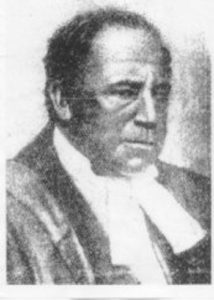
Cornerstone
*This date celebrates the birth of Jehu Jones, Jr., a Black slave and minister who was born in 1786.
From Charleston, SC, he was named after his father, Jehu Sr., a tailor who gained his freedom in 1798 and later owned an exclusive hotel in Charleston. Originally connected with the Episcopal Church, the younger Jones became a member of St. John's Lutheran Church in Charleston in the 1820s and was ordained in 1832. This was performed through the New York Synod of the Lutheran Church. Jones then became a missionary to Liberia to accompany freed slaves to that African nation. Jones returned to Charleston after his ordination and was jailed briefly for violating South Carolina's law prohibiting the immigration of free Blacks.
Jones eventually settled in Philadelphia, the largest city in the country at that time. In June 1833, the Pennsylvania Ministry determined that Jones be appointed "to labor as a Missionary... among the colored people in Philadelphia under the direction of our Ministers." On February 16, 1834, the St. Paul's congregation he had founded in Philadelphia decided to build a church and solicit support from other Lutheran congregations. In June of that year, he purchased two lots on Quince Street in Philadelphia for the church.
Assisted by Pastors Philip Mayer of Philadelphia and Benjamin Keller of St. Michael's Church in Germantown, Jones laid the cornerstone for the building (which was only recently identified as still standing at 310 South Quince Street). The congregation paid nearly 40 percent of the costs when the building was dedicated in 1836. Because the rest of the funding (about $1,300) wasn't obtained, the building was sold at a sheriff's auction in 1839. Jones continued to serve the congregation until 1851.
Throughout his Philadelphia career, Jones was active in the city's social and political life. In 1845, he organized a convention at Temperance Hall to unite free blacks and petition local authorities for civil rights. He and members of St. Paul's were active in the Moral Reform and Improvement Society, an association of Black Churches in the city dedicated to improving the social conditions of the Black community. Jehu Jones died in 1852.
An Encyclopedia of African American Christian Heritage
by Marvin Andrew McMickle
Judson Press, Copyright 2002
ISBN 0-817014-02-0